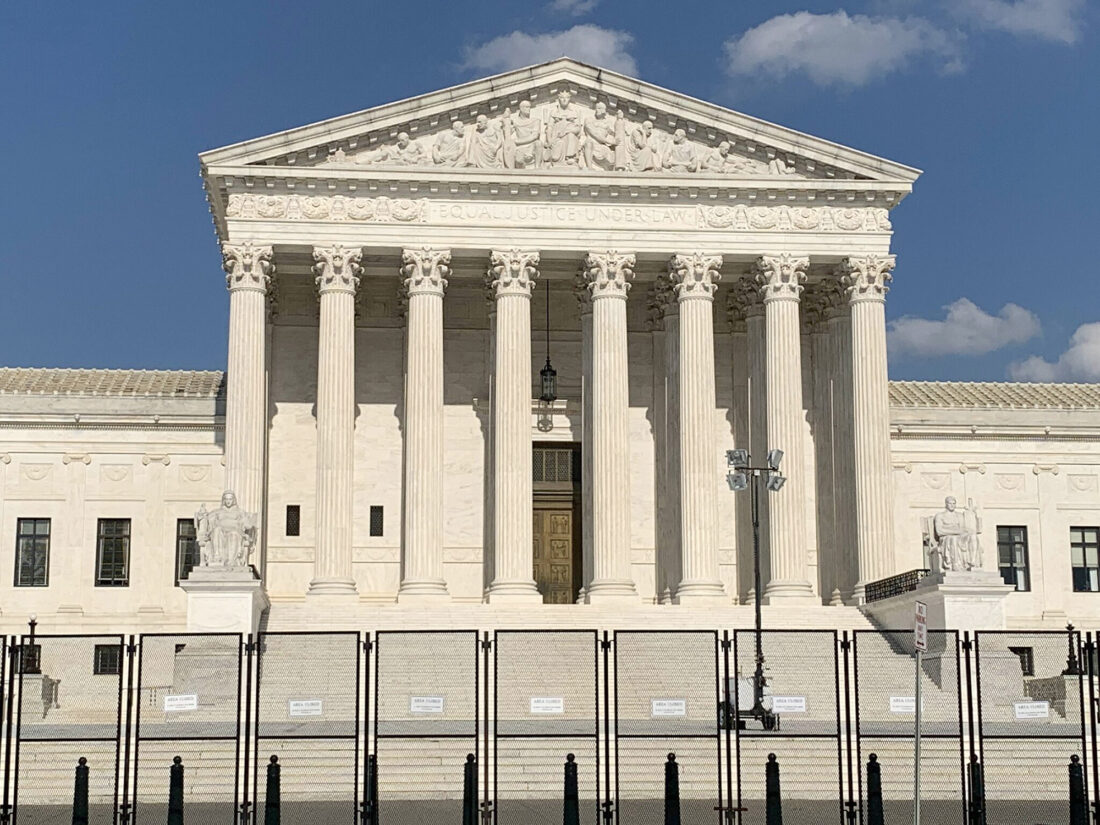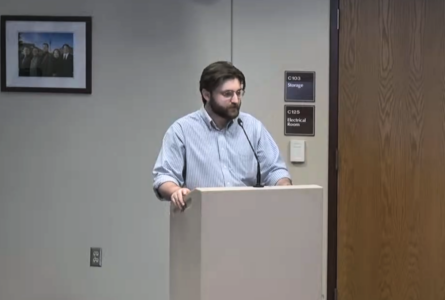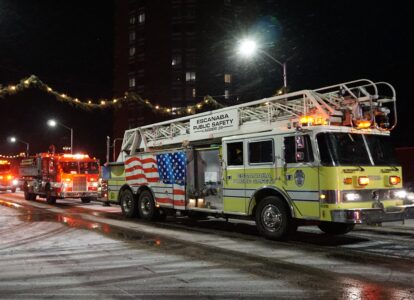Tribes ask US Supreme Court to send Line 5 pipeline back to state court

The U.S. Supreme Court’s front steps in Washington, D.C. (Katherine Dailey |Michigan Advance)
Ten Tribal Nations in Michigan have filed an amicus brief to the U.S. Supreme Court urging them to reject an attempt by Canadian oil pipeline company Enbridge Energy to have a federal court settle a lawsuit first brought by Attorney General Dana Nessel in 2019, asking instead to have the case remain in state court.
“For many years, Tribal Amici have called on the State to uphold its public-trust obligation to protect the Straits of Mackinac and the Great Lakes, including the fisheries, from these known dangers of the aging Straits Pipelines,” the Tribal Nations wrote in their brief. “Michigan’s suit against Enbridge is a long-overdue course correction.”
The brief cites the leak of a different pipeline, Enbridge’s Line 6B, into the Kalamazoo River in 2010, and the environmental harms that resulted from that.
Nessel is seeking to close the pair of pipelines that run through the Straits of Mackinac as the pipes were aging, looking to prevent a leak that could substantially contaminate the Great Lakes. While the suit was initially filed in state court, it has bounced between state and federal court in a question of who has jurisdiction.
The Sixth Circuit Court of Appeals last year sent the case back to state court, which was a win for Nessel, but in June, the U.S. Supreme Court decided to take up the case on an appeal from Enbridge. While the case had been in the federal appellate court, 63 tribal nations — again led by the Bay Mills Indian Community — filed a similar brief seeking to have the case return to state court.
The decision from the Sixth Circuit came down to a 30-day deadline to request the case move to federal court, which the court determined Enbridge missed. The Supreme Court took up the case in June, and will decide whether Enbridge should be granted an exemption to that 30-day deadline.
“No part of Section 1446 allows a defendant to escape the 30-day deadline by asserting that it only recently discovered that a federal court might be more sympathetic to its arguments,” the amicus brief reads. “But at bottom, that is Enbridge’s explanation for what it attempted here.”
“Enbridge missed a court deadline by more than two years, without excuse, and now they want to change the rules,” Caroline Flynn, a lawyer at Earthjustice who is representing the Tribes, added in a news release. “The Supreme Court should see through Enbridge’s transparent attempt at gamesmanship.”
The Tribal Nations also argued that federal courts should not “encroach” on state court jurisdictions.
“If it were not for Enbridge’s procedural gamesmanship, the merits of this state public-trust dispute may well have been settled long ago — and the risks to Tribal Amici’s critical treaty-protected resources addressed,” the brief continues.
The Tribal Nations that joined the amicus brief are Bay Mills Indian Community, Grand Traverse Band of Ottawa and Chippewa Indians, Hannahville Indian Community, Keweenaw Bay Indian Community, Lac Vieux Desert Band of Lake Superior Chippewa Indians, Little River Band of Ottawa Indians, Little Traverse Bay Bands of Odawa Indians, Nottawaseppi Huron Band of the Potawatomi Tribe (NHBP), Pokagon Band of Potawatomi, and the Sault Ste. Marie Tribe of Chippewa Indians.
“The continued operation of Line 5 puts my Tribal Nation in grave danger,” Whitney Gravelle, president of the Bay Mills Indian Community, said in the news release accompanying the brief.
“We are encouraged the U.S. Supreme Court has agreed to review the June 2024 decision of the U.S. Court of Appeals for the 6th Circuit remanding to state court the Michigan Attorney General’s lawsuit against Enbridge seeking to shut down Line 5,” Ryan Duffy, a spokesperson for Enbridge wrote to the Advance.
Duffy did not specifically comment on the amicus brief.
“The 6th Circuit’s remand decision is in conflict with decisions from two other federal Circuit Courts of Appeals, which both held that there can be exceptions to the 30-day limit,” he added. “The Supreme Court review will resolve this conflict in the courts of appeals.”
———
Michigan Advance is part of States Newsroom, a national 501(c)(3) nonprofit. For more, go to https://michiganadvance.com.






